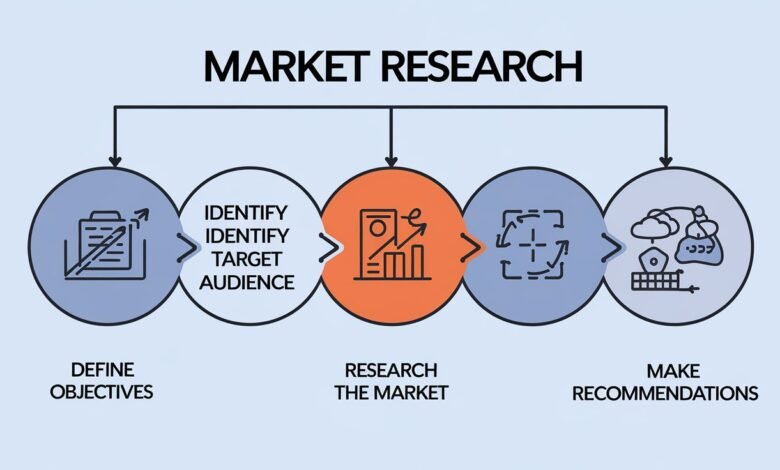In a saturated market, building a brand that truly stands out requires more than a clever tagline or catchy visuals. Successful brands are built on a deep understanding of customer needs, emerging trends, and competitive landscapes. Market research acts as the cornerstone of this knowledge, providing actionable insights to create a brand strategy that resonates. This article explores how market research can elevate your brand and give it a competitive edge, specifically looking at how
B2B market research services can play a crucial role for businesses in competitive industries.
1. Identifying Your Unique Brand Positioning
Market research helps brands uncover unique market opportunities that align with customer preferences and expectations. By analyzing competitors, brands can identify gaps or unmet needs in the market. For instance, a technology firm might find a demand for eco-friendly solutions in a specific sector, allowing it to position itself as a sustainable technology provider.
2. Understanding Your Target Audience at a Deeper Level
Knowing your audience beyond basic demographics is key to delivering relevant messaging. Market research dives deep into the psychographics and behavioral trends of target groups, enabling brands to connect on a personal level. B2B market research services, in particular, specialize in identifying decision-makers’ needs, preferences, and pain points, allowing brands to craft messaging that resonates with the intended audience.
3. Analyzing Competitors for a Competitive Edge
A thorough competitor analysis reveals the strengths and weaknesses of other brands in your market, enabling you to refine your strategy accordingly. By understanding competitor pricing, brand positioning, and customer service approaches, brands can find ways to differentiate and stay a step ahead. This insight is especially useful in markets with fast-changing dynamics, where brands need to adapt quickly to maintain relevance.
4. Guiding Product Development to Meet Market Demands
Market research isn’t just about marketing—it also plays a crucial role in product development. By understanding the needs and preferences of your target audience, brands can create products that meet real demands rather than relying on guesswork. This approach not only saves time and resources but also increases the chances of a successful product launch.
5. Shaping Effective Marketing Strategies with Data
A data-driven marketing strategy is more effective and efficient than one based on assumptions. Market research allows brands to craft targeted campaigns, ensuring that they reach the right audience at the right time. Whether through digital channels, content marketing, or advertising, a targeted strategy enhances ROI, engagement, and brand loyalty.
6. Evaluating Customer Perception and Brand Loyalty
Understanding how your brand is perceived by the market is invaluable. Through surveys, focus groups, and other feedback tools, brands can gauge customer sentiment, identify areas for improvement, and track loyalty. This feedback loop ensures that brands can pivot when necessary, maintaining a positive reputation and strong customer relationships.
7. Forecasting Market Trends to Stay Ahead
Predicting what comes next can make the difference between success and stagnation. Market research helps brands stay on top of industry shifts, technological advancements, and customer behavior trends. Brands that use research to anticipate changes can position themselves as innovators, keeping their offerings relevant and timely.
8. Personalizing Customer Experiences for Stronger Engagement
Today’s consumers expect personalized experiences that cater to their unique needs and preferences. Market research provides insights into customer behaviors, enabling brands to create tailored experiences that drive engagement and loyalty. For example, in B2B markets, knowing a client’s specific needs and expectations allows companies to offer customized solutions that strengthen relationships.
9. Improving Brand Messaging to Enhance Resonance
Clear, relevant, and consistent messaging helps brands build trust and recognition. Market research reveals which messages resonate most with target audiences, guiding brands in refining their tone, voice, and storytelling approach. This insight is particularly valuable in crowded markets, where standing out requires not only a distinct identity but also a message that speaks directly to customer values.
10. Validating Marketing Channels for Maximum Reach
Not all channels work for every brand, and spreading resources too thinly can dilute impact. Market research identifies which platforms are most effective for reaching your specific audience, allowing brands to focus their efforts and resources on high-impact channels. This approach ensures that marketing investments are optimized, reaching potential customers where they are most active.
11. Leveraging Customer Feedback for Continuous Improvement
Brands that actively listen to their customers are more likely to build lasting loyalty. Regularly collecting and analyzing customer feedback through market research helps brands make necessary adjustments, whether to products, services, or customer support. This ongoing improvement not only enhances customer satisfaction but also strengthens brand loyalty and advocacy.
12. Gaining Insight from B2B Market Research Services
For brands in the B2B space, specialized market research services offer valuable insights into the complex dynamics of business-to-business relationships. B2B market research services help brands understand the intricacies of B2B decision-making, providing insights that can lead to stronger relationships and more targeted marketing strategies. This is particularly useful in industries where purchasing decisions are influenced by multiple stakeholders and involve a high level of scrutiny.
13. Measuring Brand Health and Adjusting Strategy
Tracking brand health is essential to staying relevant. Market research provides metrics on brand awareness, customer satisfaction, and competitive positioning, allowing brands to assess their performance and make data-driven adjustments. Consistent monitoring ensures that brands can respond proactively to any decline in market perception or emerging competition.
Conclusion
Market research has become an essential part of a successful brand strategy, enabling businesses to understand their audience, anticipate trends, and remain competitive. By leveraging insights from B2B market research services, brands can fine-tune their strategies to resonate with their audience and stand out in crowded markets. Investing in market research is an investment in building a brand that not only meets but exceeds customer expectations, establishing a strong foundation for long-term success.


